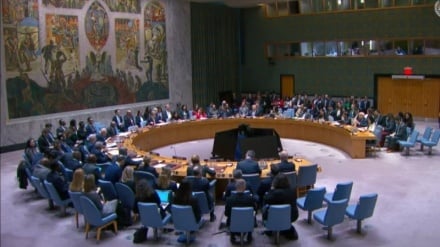Is banning Israeli goods an effective step in supporting Palestine?
Pars Today – In response to the ongoing attacks and inhumane actions of the Zionist regime in Gaza, the Irish government has decided to ban the import of goods produced in illegal Jewish settlements in the occupied Palestinian territories.
The Irish parliament is set to finalize the ban on goods produced in Jewish settlements in the occupied territories on Tuesday. Once approved, the import of such products will be prohibited, and purchasing them will be considered a criminal offense.
This move by Ireland comes as Micheál Martin, the country’s prime minister, recently called for sanctions against settlers and two extremist ministers of the Zionist regime—Itamar Ben Gvir and Bezalel Smotrich—during the latest European Council meeting (June 26). The Irish prime minister also expressed concern over the dire humanitarian situation in the Gaza Strip, stating that the European Union should take stronger measures, including suspending its cooperation agreement with the Zionist regime, to enforce international human rights standards.
The Irish government’s recent decision to ban goods produced in West Bank settlements marks a significant shift in the stance of some European countries toward the policies and actions of the Zionist regime in the occupied Palestinian territories.
In reality, the ongoing war in Gaza, the intensification of attacks by the Zionist regime, and policies such as blocking food and medicine from entering Gaza, deliberately targeting Palestinian women and children, and burning refugee tents have led even some former supporters of Israel to recognize the depth of the Zionists' crimes, change their positions, and join the ranks of critics against this regime.
Although the Boycott, Divestment, and Sanctions (BDS) movement had previously managed to gain widespread support in Europe, the U.S., and other parts of the world, pressuring many companies and institutions to cut ties with illegal settlements, the scope of joining this movement has expanded significantly following the recent Gaza war and the exposure of the Zionist regime’s crimes.
The BDS movement emerged in the mid-2000s in many countries, including European nations, with the goal of pressuring Israel to end its occupation, halt settlement expansion, respect Palestinian rights, and allow the return of refugees.
Supporters of this movement have sought to compel Israel to change its policies through economic, political, and cultural boycotts. In this context, various European countries issued guidelines requiring Israeli goods to be labeled separately, enabling consumers to distinguish between products made in Israel and those produced in Occupied Territories.
The movement succeeded in gaining substantial support among segments of public opinion in Europe, the U.S., and elsewhere, leading numerous companies and organizations to refrain from investing in or cooperating with illegal settlements. Over the past year, with the Gaza war and the exposure of Israel’s crimes, the movement has grown even further, attracting more supporters worldwide.
However, Israel’s disregard for global public opinion demanding an end to its atrocities in Gaza has now led to more serious economic sanctions against Israel in some European countries. In recent months, many EU member states, including Ireland, Spain, Belgium, and Slovenia, have called for an immediate suspension or review of the EU-Israel cooperation agreement—a move that has deeply troubled Israeli officials.
In response to Ireland’s unilateral decision to boycott goods produced in Israeli settlements, Yossi Dagan, head of the Council of Settlements in the West Bank, has sent a letter to several senior U.S. government and congressional officials. In the letter, he accused Ireland of “anti-Semitism,” claiming that “this decision is the first anti-Semitic law against Israel since the Holocaust.” He called on top U.S. officials to impose high tariffs on Ireland if the Irish Parliament passes the proposed law.
The Zionist regime has, for years, consistently sought to pressure various countries into supporting its policies by using the label of “anti-Semitism.” However, in light of the regime’s extensive crimes against Palestinians, such accusations are no longer credible in the eyes of global public opinion and have lost much of their effectiveness.
Implementing policies to boycott Israeli goods would significantly impact the economy of the Occupied Territories, dealing a considerable blow to producers and companies operating there. Moreover, the social and political implications of such bans are also highly significant. From the perspective of Palestinians and human rights activists, this action represents a symbol of international support for their rights and a condemnation of the occupation, contributing to greater global awareness of the Palestinian crisis.
In this context, the decision by Ireland and similar countries appears to be part of a broader shift in global policy toward the Palestinian issue—one that could increase pressure on Israel to adhere to fairer solutions grounded in international law. However, pursuing this path requires strong global will and determination, particularly in the face of the Zionist regime’s political and economic influence.
MG/ME



